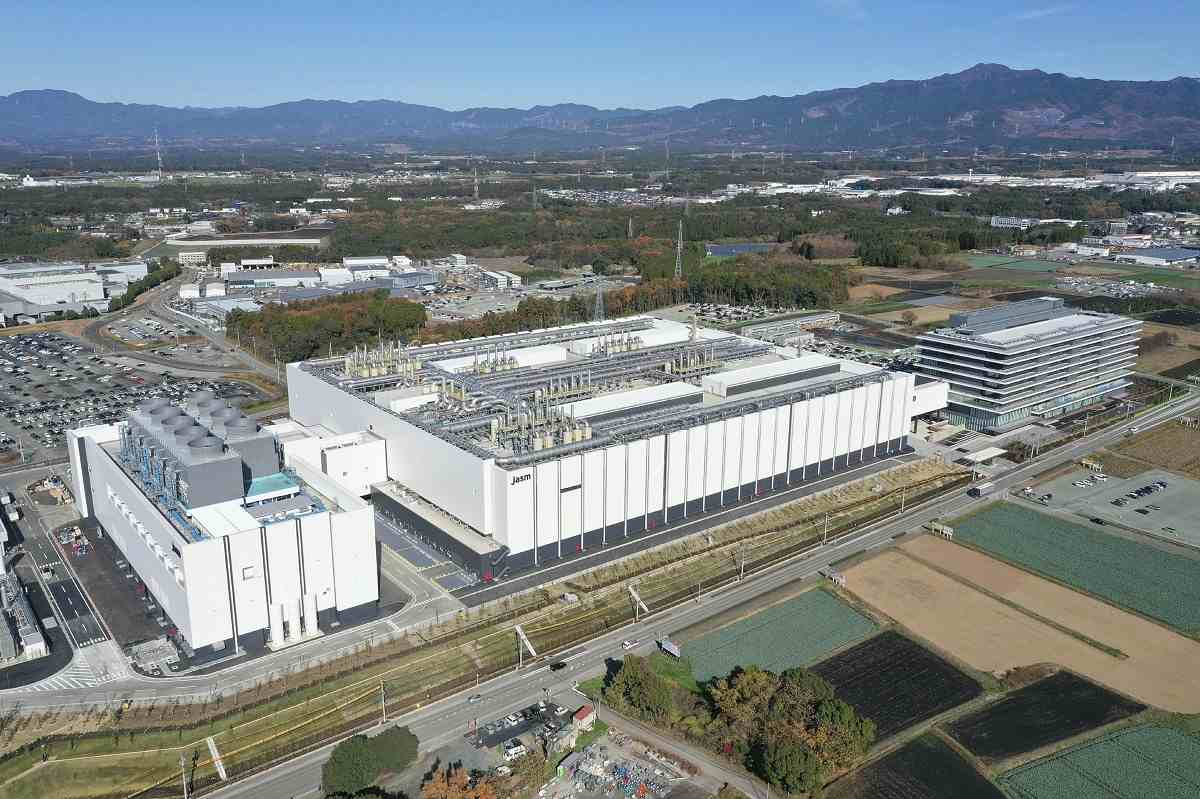Countries Worldwide Leverage Subsidies to Lure Semiconductor Plants; Japan Govt. Secures Nearly ¥4 trillion for Initiative

Taiwan Semiconductor Manufacturing Co.’s first plant in the town of Kikuyo, Kumamoto Prefecture, in December 2023
2:00 JST, March 1, 2024
Countries worldwide are stepping up efforts to lure semiconductor plants, leveraging a massive amount of subsidies. The move appears to be accelerating against the backdrop of the growing rift between the United States and China.
The U.S. government announced earlier this month that it will award a grant of $1.5 billion to GlobalFoundries, or GF, a leading U.S. contract chipmaker.
“Semiconductors are in everything from our cellphones, to refrigerators, to cars, and our most advanced weapons systems, and access to them carries important economic and national security implications,” said U.S. Secretary of Commerce Gina Raimondo.
GF, which manufactures chips used in automobiles, satellite telecommunications and other products, plans to build a state-of-the art plant in the state of New York and modernize existing production bases with the government funding.
The grant will be provided based on the CHIPS and Science Act, under which a total of $52.7 billion will be extended to the semiconductor industry. GF is the third recipient of such a grant, following $35 million to British arms and aerospace firm BAE Systems, Inc. and $162 million to Microchip Technology Inc. of the United States.
The United States’ chip-production capacity accounts for only a little over 10% of the global capacity. Concerned that depending on other countries for chip supplies raise security risks, the U.S. government is expediting efforts to expand chip production bases in the country.
Recipients of the U.S. government grant are restricted from new investments in China and other countries of concern for 10 years. The U.S. government may decide to provide the grant to Intel Corp. of the United States and Taiwan Semiconductor Manufacturing Co., or TSMC, which are proceeding with plant constructions in the United States.
Generous support
For its part, the Japanese government is striving to attract chipmakers and plants in line with its Strategy for Semiconductors and the Digital Industry compiled in 2021. It has already secured a total of about ¥4 trillion for the initiative, including the appropriation of a total of ¥2.1 trillion in fiscal 2021 and 2022.
The initiative’s biggest milestone, as a government source has put it, is the TSMC plant in Kumamoto Prefecture: With subsidies of up to ¥476 billion, Japan succeeded in attracting the Taiwan chip giant’s first plant in the country. And the firm is already set on building its second plant in the prefecture.
The European Union is also ramping up efforts to attract chipmakers in the region in line with the European Chips Act, under which the EU will mobilize €43 billion in public and private investment by 2030. Although the EU has in principle banned extending government subsidies to private firms, the chip industry was made an exception. TSMC and Intel have expressed intentions to build plants in Germany.
With technical innovations in the semiconductor industry ever-advancing, chipmakers require a constant, massive amount of investment in research and development as well as in their facility and equipment.
Under such a background, government subsidies and grants affect companies’ decisions on where to expand, resulting in accelerated competition to luring them.
Japan provides more generous assistance measures than other countries. The government plans to cover about half of the total amount of TSMC’s investment with subsidies.
According to materials compiled by the Finance Ministry in autumn last year, government assistance in the United States, including government loans, was 15% of the total amount of investment.
The spread of artificial intelligence is expected to further increase demand for semiconductors. But some within the government are expressing caution.
“The industry’s future is unpredictable, so government assistance involves some risk,” said a government source. “It’ll be necessary to restrain competition over subsidies to some extent.”
Top Articles in Business
-

Prudential Life Insurance Plans to Fully Compensate for Damages Caused by Fraudulent Actions Without Waiting for Third-Party Committee Review
-

Narita Airport, Startup in Japan Demonstrate Machine to Compress Clothes for Tourists to Prevent People from Abandoning Suitcases
-

Japan, U.S. Name 3 Inaugural Investment Projects; Reached Agreement After Considerable Difficulty
-

Toyota Motor Group Firm to Sell Clean Energy Greenhouses for Strawberries
-

SoftBank Launches AI Service for Call Centers That Converts Harsh Customer Voices into Softer Voices
JN ACCESS RANKING
-

Japan PM Takaichi’s Cabinet Resigns en Masse
-

Japan Institute to Use Domestic Commercial Optical Lattice Clock to Set Japan Standard Time
-

Israeli Ambassador to Japan Speaks about Japan’s Role in the Reconstruction of Gaza
-

Man Infected with Measles Reportedly Dined at Restaurant in Tokyo Station
-

Videos Plagiarized, Reposted with False Subtitles Claiming ‘Ryukyu Belongs to China’; Anti-China False Information Also Posted in Japan























